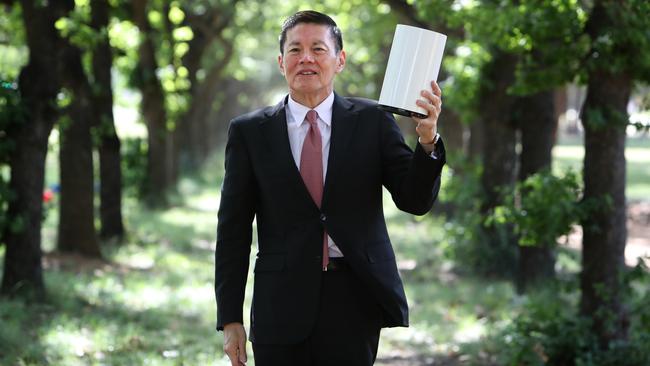Optus flicks switch on first 5G home broadband plan
Optus has unveiled Australia’s first 5G home broadband plan, with its unlimited offer set to compete against the NBN by March.

Optus boss Allen Lew is confident the telco’s new 5G home broadband service can go toe to toe against the National Broadband Network in selected areas, saying homes looking to cut the cord could still get a top-notch experience.
“This service is an alternative to a fixed-line service and we know that almost 25 per cent of households in Australia don’t want a fixed line coming inside their home,” Mr Lew told The Australian.
“This is a much better service to what’s currently offered over a 4G network.”
The telco yesterday became the first operator in Australia to launch a 5G service — a $70-a-month unlimited plan that guarantees download speeds of 50 megabits per second — comparable to that delivered over the NBN.
Optus’s 5G home broadband service is set to hit selected suburbs by next month, and Mr Lew said the coverage footprint would expand between now and the end of next year.
The telco has 5G sites live in two suburbs in Canberra and a site live in Sydney. Another 47 sites are planned to be online by next month.
Mr Lew said the 5G sites going live by next month would be the first phase of Optus’s plan to roll out 1200 5G sites across the country by next year.
“We have three live in-network 5G cells but we will be turbocharging our rollout over the next 12 months,” he said.
NBN Co already competes against fixed wireless services that are delivered over 4G mobile networks. Seventy-four per cent of Australian homes are signed up to the NBN, with the rest using a wireless broadband service.
The biggest issue with providing reliable high-speed broadband over 4G networks is the capacity of the networks. The 5G technology allows telcos to boost capacity significantly, opening the door to chase more customers, although the full potential of 5G is unlikely to be realised until after next year.
NBN Co expects its rollout to be completed by next year, when 5G deployment will still be in the early stages, protecting the company from any threat of customers opting out of the NBN for a fixed wireless service.
“Mobile operators continue to acknowledge the NBN access network will serve the vast majority of the market for broadband and will play a critical role in meeting consumer needs for high-speed data,” an NBN Co spokesman told The Australian.
Mr Lew said that while 5G technology could not completely replace the NBN, it could power a viable alternative to the taxpayer-funded network, especially in cities.
“The technology is undergoing an evolution and over time the speeds will increase, but we see our service complementing the NBN, which has a different set of solutions. Ours will meet the needs of those homes looking for a flexible home broadband solution.
“Australia is a huge country and in capital cities, if the density is right, 5G will be a good solution, and that means you don’t have to take fibre to every home.”
Optus is working with Nokia as its major equipment provider, although Optus is open to installing gear from other vendors such as Ericsson and Samsung.
Nokia plays a key role inside Optus, with the Finnish company managing the telco’s mobile and fixed network operations and providing maintenance services.
Optus had to rethink its 5G road map in light of Canberra’s decision to ban the use of equipment from Chinese giant Huawei on 5G networks. Mr Lew said Huawei’s exclusion had not forced Optus to spend more money to deliver its 5G service.
“The positive part of the ban was that it was flagged to us in advance so we narrowed down our alternatives pretty quickly, and it hasn’t hurt our ability to deliver an affordable service to customers,” he said.
TPG Telecom this week scrapped its mobile plans, citing the increased costs it would have to absorb because of the ban on Huawei’s 5G gear.
Optus’s 5G service will be delivered through a home gateway (modem), which can be returned to the telco if customers don’t get the promised download speeds of at least 50Mbps.
“At this point we are confident that 50Mbps is the minimum speed our customers can expect. We will be monitoring the service to make sure it delivers that even between 7pm and 11pm,” Mr Lew said.
He said connecting to the service would not require the installation of extra equipment. “The home gateway is part of the service. You bring it home and it works with our 5G network, but for the first 50 customers we will do a professional install because it’s a new technology and we want to make sure the technology is working perfectly.
“There will be no need for any antennas on roofs.”
With 5G smartphones expected to hit the market by the end of this year, Optus’s 5G network will be ready to offer mobile services.
“We are working with a range of smartphone manufacturers and will announce details about 5G smartphone handset availability and plans in the future,” Mr Lew said.




To join the conversation, please log in. Don't have an account? Register
Join the conversation, you are commenting as Logout